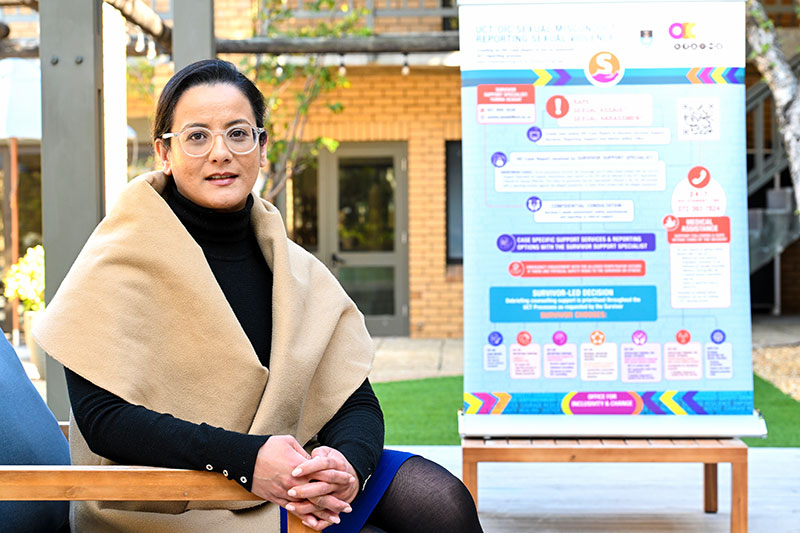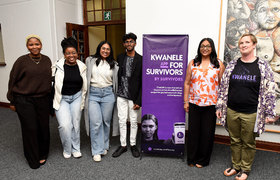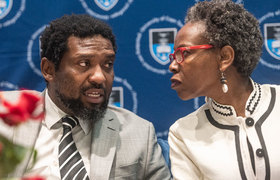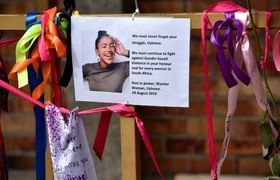UCT affirms its commitment to safeguarding vulnerable persons within its community
21 August 2024 | Story Lyndon Julius. Photos Lerato Maduna. Read time 7 min.
The University of Cape Town (UCT) took a closer look at the National Register for Sex Offenders (NRSO) through a recently held workshop with key stakeholders. The workshop was held on 16 August with the theme: “Vetting Processes in the National Register for Sex Offenders (NRSO): Decentralisation of the NRSO Registrar’s Functions to the Regions and Operational Vetting Procedures”.
The NRSO was created by an Act of Parliament in 2007 to maintain a record of individuals convicted of sexual offenses against children and people with mental disabilities. This register helps employers in various sectors, including public and private organisations like schools, daycare centres, and hospitals, to ensure that potential employees are appropriate for working with children or individuals with mental disabilities.
Held in the Mafeje Room at the Bremner Building, the event aimed to inform UCT personnel about the NRSO’s procedures and the vital role they play in protecting vulnerable persons, including females under 25, children, the elderly, and disabled individuals.
The workshop kicked off with an official welcome by UCT Vice-Chancellor (VC) Professor Mosa Moshabela, who highlighted the university’s commitment to fostering a safe and inclusive environment.
“This workshop is a testament to our dedication to the well-being of every individual within our community,” Professor Moshabela said. “We recognise the importance of these discussions and the implementation of measures that protect the most vulnerable among us. It’s not just about compliance – it’s about our moral responsibility.”
Expanding the definition of sexual offenses
The workshop gained much interest and was attended by colleagues from the Cape Peninsula University of Technology (CPUT) and Rhodes University as well.
“The primary purpose of convening this workshop was to ensure that all relevant UCT stakeholders who are required to implement this legislation were brought together to collectively construct an internal response that supports the university with minimal impact on the academic enterprise and operations of the university,” said Dr Sianne Alves, the director of UCT’s Office for Inclusivity & Change (OIC).
One of the key topics discussed was the expanded definition of sexual offences. The NRSO now includes a broader range of actions under its purview, such as sexual intimidation and harassment. If an individual experiences behaviour that makes them feel uncomfortable or threatened – whether through words or actions – this can now be reported as a sexual offence. The workshop encouraged that any form of sexual misconduct must be taken seriously, and those found guilty of such offences will face severe consequences.

The inclusion of females under 25, particularly students in higher education, in the NRSO highlights the university’s responsibility to protect young women. This is particularly relevant given the high concentration of female students meeting this age group at UCT.
Ntombizodwa Matjila, the registrar of the NRSO, underscored the essential role the organisation plays in safeguarding vulnerable populations. “The NRSO serves as a critical tool in our national strategy to protect vulnerable individuals from sexual offenders,” she said. “By ensuring thorough vetting processes, we are upholding our commitment to creating safe spaces, particularly in environments like educational institutions where trust is paramount.”
Addressing the challenges
A significant challenge discussed was the issue of unreported sexual offences, particularly in cases where individuals resign before formal charges can be brought against them.
Another critical point of discussion was the decentralisation of the NRSO registrar’s functions to the provincial level, making it easier for institutions like UCT to access the register. This decentralisation is part of a broader effort by the Department of Justice and Constitutional Development (DoJ&CD) to increase access to justice and ensure that vulnerable persons are protected more effectively.
Advocate Lwandiso Kwababana, the assistant director at the justice department, delivered a comprehensive overview of the NRSO’s operational procedures, emphasising the significance of decentralising the registrar’s functions to regional offices. “Decentralisation is a strategic move to bring the NRSO closer to communities,” Advocate Kwababana said. “This approach not only enhances accessibility but also ensures that vetting processes are conducted with greater efficiency and responsiveness to local needs.”
Kwababana detailed the procedures for accessing the NRSO, specifically the use of forms J738 and J739. These forms are used to check if an individual’s particulars are on the register and are essential tools for UCT in its vetting processes.
In addition to staff, the workshop also addressed the vetting of students who may interact with vulnerable populations through clinical placements, social responsibility projects, or sports coaching.
Ethical and legal considerations
The workshop also delved into the ethical and legal considerations surrounding the reporting of sexual offences. While the NRSO gets activated upon a conviction, there remains a grey area when dealing with allegations that have not yet led to formal charges. UCT must navigate this complex landscape carefully, balancing the need to protect vulnerable persons with the legal constraints surrounding confidentiality and the presumption of innocence.
The workshop concluded with a call to action for UCT and other higher education institutions to take a proactive stance in reporting sexual offences. Institutions must not contain these issues within their internal processes but must report them to the South African Police Service (SAPS) to ensure that justice is served and that offenders are held accountable.
UCT’s commitment to a safer environment
The workshop reaffirmed UCT’s dedication to creating a safe environment for all members of its community. The comprehensive services including psychosocial education by the OIC are aimed at reducing incidences through education and community cohesion that align with values and principles of the university. One of the key strengths of the UCT response over the past five years is the initiative of the Case Reporting tool, which was designed by UCT to inform programmatic response in prevention, survivor support and evidence storage, including referral internally and external to the university. This is UCT’s mechanism to activate support and assistance for any form of gender-based violence.
Advocate Barbara Mapara, the Human Resources director of Employee Relations at UCT, provided insights into how UCT is adapting its policies to meet the requirements set forth by the NRSO. She highlighted the university’s proactive stance in ensuring compliance and safety. “At UCT, we are not merely complying with the law; we are taking a leadership role in establishing robust safeguards,” Advocate Mapara said. “Our commitment to the safety of our students and staff is unwavering, and we are continuously refining our processes to reflect this dedication.”
 This work is licensed under a Creative Commons Attribution-NoDerivatives 4.0 International License.
This work is licensed under a Creative Commons Attribution-NoDerivatives 4.0 International License.
Please view the republishing articles page for more information.










